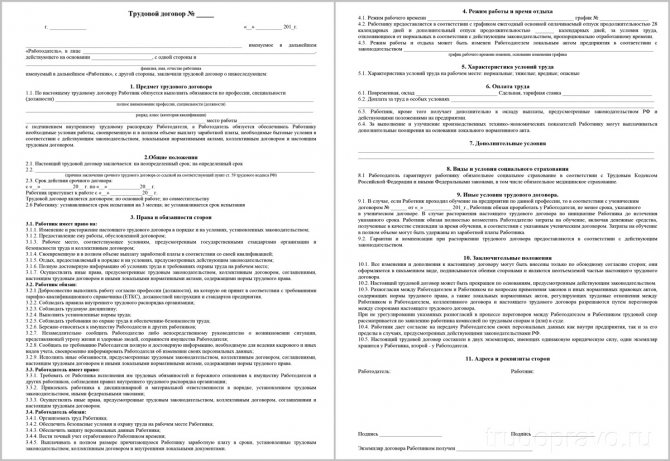What is an employment contract
An employment contract is a written agreement between an employee and an employer, which regulates their rights and obligations. The employer undertakes to provide the other party to the employment contract with work, create all the necessary conditions for its implementation, timely pay wages and provide all guarantees provided for by labor legislation. The employee, for his part, undertakes to provide the labor function assigned to him and to comply with the rules adopted in the company or organization.
The first page of the employment contract must contain the identifying information of the employee and the employer
An employment contract is concluded in the process of hiring an employee for work. There is no strict requirement to complete it within a certain period of time after, for example, an interview, and it does not make sense. After all, the hiring process can take a lot of time; oral agreements between the parties on the start date of work often play a big role. In some cases, an applicant for a vacancy needs time to complete all matters at his previous job - from the two weeks allotted by the Labor Code (Labor Code of the Russian Federation) to notify the current employer of the upcoming dismissal, to another date agreed upon by the future employee and his current employer. Other companies may be looking for an employee for the future.
A real-life incident: a job seeker applied for a vacancy in the Russian representative office of an American company. He successfully went through all the stages of selection, and then it turned out that they would be happy to see him... in six months. This is a common practice in the USA. Only the candidate needed the job today and now.
It's a different matter when it comes to an employee going to work. The law allows three days for concluding an employment contract with him. No more than three days from the date of signing the employment contract are allotted for issuing an employment order.
Not only legal entities, but also individuals, including those with individual entrepreneur status, have the right to act as an employer. Individuals without individual entrepreneur status can act as an employer when hiring gardeners, housekeepers, nannies and other household staff. But with regard to the employee, the spectrum is not so wide. By law, only individuals can act in this capacity.
If a potential employee is registered as an individual entrepreneur, this is not an obstacle to employment. It’s just that his work for hire cannot be considered an entrepreneurial activity, the salary is subject to personal income tax and is not reflected in the individual entrepreneur’s reporting, and all guarantees are provided by the employer, such as: payment of sick leave and vacations, contributions to extra-budgetary funds (which does not relieve one from the obligation to make them for oneself) as an individual entrepreneur) and others rely on him in full.
The law allows for the conclusion of two types of employment contracts:
- urgent, which specifies the expiration date of its validity;
- unlimited, which does not have an expiration date and can only be terminated according to the procedure provided for by law at the initiative of one of the parties on the grounds prescribed by law (the Labor Code of the Russian Federation).
In most cases, an employment contract is concluded for an indefinite period. When concluding an urgent agreement, the need for such an option must be justified, including in the text of the contract.
In some cases, the requirement to conclude a fixed-term employment contract may arise from the provisions of the current legislation regulating a particular area of activity of state and municipal organizations. On a competitive basis, for a certain period of time, school directors, rectors of universities, and chief doctors of medical institutions financed from the budget are hired. In the non-state sector, the procedure for appointing management employees may be regulated, for example, by the company’s charter and also imply appointment to a position with a limited term.
At what age can foreign citizens enter into an employment contract?
The labor activity of foreigners who arrived in the Russian Federation without the obligation to obtain a visa can be carried out with a patent, as determined by Federal Law No. 357, adopted on November 24, 2014. The law determined the right of Russian employers to involve foreigners whose age is equal to or exceeds 18 in the performance of labor functions years.
Such persons can be employed in enterprises, organizations and institutions, to provide for personal, household or auxiliary needs that are not related to the implementation of individual entrepreneurship. For those persons of foreign origin who do not have Russian citizenship and whose age has not reached 18 years, employment in the Russian Federation is impossible.
Registration of labor relations in 2021
From January 1, 2021, an employer who is a small business entity, which is classified as a micro-enterprise, has the right to conclude a standard employment contract with an employee, approved by the Government of the Russian Federation in August 2021 . However, it is not necessary to focus on it. At his discretion, the employer can use his own version of the document or approach the standard form creatively, taking from it only those provisions that are relevant to him, or setting out individual points in his own edition. In this case, an important condition relates to the listing of the parties to the agreement with the individual entrepreneur. Thus, in the employment contract between the individual entrepreneur and the individual entrepreneur there must be a mandatory indication that the agreement is concluded between two individuals with the status of an individual entrepreneur.
An important condition is a legislative ban on contractual clauses that could worsen the position of the parties in comparison with the norms of legislation in the labor sphere. This applies, in particular, to such issues as vacation and its duration, sick pay, frequency of salary payments (according to the law and the standard contract, strictly twice a month), etc.
The form in which the employment contract is concluded must only be written. There can be no talk of any verbal agreements - this is a gross violation of the law.
When applying for a job and concluding an employment contract, you must provide the employer with the following package of documents:
- passport or other identity document;
- certificate of assignment of TIN;
- work book, except for a part-time job;
- SNILS;
- military ID or other military registration document for those liable for military service;
- document confirming the required qualifications, if applicable;
- a certificate of no criminal record or termination of criminal prosecution on rehabilitative grounds for employment in positions for which current legislation requires applicants to have no criminal record;
- a certificate from a drug dispensary for employment in positions for which the law provides for appropriate restrictions.
If a candidate is applying for a job for the first time and has not yet acquired a TIN, the employer must help him obtain one. The same is true with SNILS and a work book during initial employment.

Presentation of a passport by an employee when concluding an employment contract is mandatory
The new employee can begin to perform his official duties even before signing the contract. There is no violation of this if the employer meets the three-day deadline during which he must draw up an employment contract with him. But the start date of the employment relationship in this case will be considered not the date of signing the document, but the actual date of admission to work. However, in practice, contracts in such situations are often concluded retroactively. However, experienced HR specialists recommend issuing a hiring order from the date the employee actually leaves.
If the terms of employment include a probationary period, this must be agreed upon with the candidate before he starts work and reflected in the employment contract and employment order. When an order is issued before the contract is signed, the probationary period provision in it becomes mandatory. Otherwise, it will not be possible to include it in the employment contract.
The following samples will help you cope with the task of drawing up an employment contract:
- standard employment contract (filling example);
- employment contract with a minor employee;
- unlimited contract for 0.5 rates;
- open-ended employment contract with a probationary period.
Video: important nuances of concluding an employment agreement
What documents are needed
The procedure for concluding an employment contract includes the right of the employer to ask the applicant for documents.
- Passport or other document confirming the identity of the applicant.
- Work book. When an applicant is employed for the first time, has lost his work permit, it is damaged, it will be taken over by the organization’s personnel service, and the part-time worker must submit a certificate or a certified copy of the work record.
- A part-time worker entering a production facility with harmful, dangerous factors will be required to provide a certificate about the conditions at the main workplace. According to Art. 282 of the Labor Code of the Russian Federation, part-time work in hazardous, hazardous production is prohibited if the employee works in such conditions at his main place.
- Insurance certificate of compulsory pension insurance. For those who are employed for the first time, it is formalized by the organization that accepts it.
- Military ID or registration.
- A document that indicates completion of a vocational educational institution or courses. For example, the driver must have a license to drive vehicles of the appropriate category.
- A certificate that the applicant has not been convicted and has not been subject to criminal prosecution. The certificate will be needed when applying for a job:
- in air transportation;
- in ensuring safety in transport, in the fuel industry, in the electric power industry;
- pedagogical profile;
- related to minors: their recreation, health improvement, medical care;
- to sports organizations where minors are members, cultural and art organizations where they work (Articles 331, 351.1 of the Labor Code of the Russian Federation);
- to clearing organizations.
- A certificate that the applicant has not been administratively punished for the use of narcotic or psychoactive substances. Such a certificate is needed to conclude a contract when entering security units in transport, aviation, private security, river or sea vessels, when future work is related to operating trains.
- Written permission of one parent, guardianship and trusteeship authorities for the admission of fourteen-year-olds and younger.
Documents not specified by the legislator cannot be required.
Changes for microenterprises in 2021
Some changes also affected the employment contracts of those individual entrepreneurs who, according to the Federal Tax Service, were included in the state register of small and medium enterprises in the status of a micro-enterprise. It should be remembered that the Federal Tax Service enters information into the register independently, without notifying the individual entrepreneur, so it is recommended to periodically check the status of your enterprise in the register.
The law provides for the minimum maintenance of personnel records for microenterprises. At the same time, the main document regulating the legal relationship between the employer and the employee has become the employment contract, which provides for all aspects of the employee’s work activity - the amount of wages, the amount of compensation and bonuses, guarantees and insurance cases.
In 2021, due to widespread refusals to maintain internal business documentation in individual entrepreneurs and micro-enterprises, it became mandatory to draw up a standard agreement developed back in 2021. It is distinguished by the most complete compliance with the labor legislation of the Russian Federation and, in fact, replaces many acts of personnel documentation, which micro-enterprises, by virtue of a standard agreement, will be able to refuse. A template for a standard contract can be found freely available on the Internet. In particular, additional orders on wages, internal regulations, labor protection, shift work, etc. will become unnecessary. Also, the standard contract will replace many job descriptions that burdened the documentation of small businesses.
Important! The introduction of a standard contract at a micro-enterprise and the refusal to maintain personnel documentation is formalized by order of the manager.
Secrets of proper design
There is no special form of employment contract (EA), it all depends on the rules of office work adopted by the company. Typically, the manager approves a draft agreement, according to the type of which individual agreements are drawn up.
According to the norm of Article 57 of the Labor Code, the preamble of the contract must include:

- who is the employer (name of company, full name of entrepreneur or individual);
- employer details (for a company: TIN, OGRN, address; for an entrepreneur: address and OGRNIP; for an individual: address and passport details);
- powers of the signatory (only for organizations: either a director under the charter, or another manager under a power of attorney, indicating its details);
- date of signing and place (city, town, village, etc.).
Mandatory inclusions in the TD are:
- place of work (address of production, company or its branch);
- position and profession (if the work is “harmful” or another that gives grounds for early retirement, the position and profession must comply with the directory of positions according to Resolution No. 787);
- date of the first working day;
- the end date of the fixed-term contract (or the onset of a certain moment: the end of the season, the departure of the replaced employee, etc.);
- salary amount (salary, bonuses, allowances in specific figures);
- work schedule (if it differs from that specified in the collective agreement or work schedule);
- compensation for harmfulness (milk supply rate or amount of monetary compensation);
- traveling or mobile nature of work (if any);
- workplace conditions (you can specify the type of equipment, machines, computerization, automation, etc.);
- social insurance (contributions to the Pension Fund, Social Insurance Fund).
Important: if any mandatory conditions from the list above are not specified, they need to be added:

- enter into the text of the contract;
- secured by an additional agreement.
In addition to the mandatory conditions, you can enter additional ones, for example:
- specify the location of the workplace (room, building no.);
- assign a probationary period;
- provide additional insurance.
Additional conditions should not contradict the Labor Code, for example, the full-time salary cannot be less than the minimum wage established in the region.
You can download a standard form of an employment contract in this article.
How to change an employment contract
The procedure for changing the terms of the contract depends on who initiates these innovations. It could be:
- worker;
- employer.
At the stage of discussing proposed changes, it is not necessary to put proposals in writing. But practice shows that in case controversial issues arise, it is still safer to do this. And after reaching agreements on changing working conditions, an additional agreement fixing all these agreements becomes mandatory.
An employee can submit an application addressed to the head of the organization, outlining the essence of the proposed changes. They could be, for example, a transfer to another position, to another department, a transition to part-time work, a revision of wages, etc.
If the employer agrees to the proposal, the parties draw up an additional agreement, which sets out everything they agreed on.
The employer can state his position orally or in writing, including by delivering the answer to the employee against signature, which is again more reliable in case of controversial situations.
Sometimes an employer does not have the right to refuse an employee. We are talking about transferring employees of the following categories to part-time work:
- pregnant women;
- one of the parents, guardians or guardians of a child under 14 years of age or a disabled child under 18 years of age;
- caring for sick relatives recognized by a doctor as needing it.
The employer has the right to introduce changes to the employment contract both unilaterally and as a result of agreements with the employee.
Unilateral changes are possible if they become a consequence of technological changes (introduction of new production technology, correction of business processes, etc.) or organizational changes (enterprise reorganization). In case of controversial situations, the employer must be ready to prove this to regulatory authorities or the court.
It is enough to introduce such adjustments by order, which is familiarized to the employee against signature.

It is safer to conduct all negotiations on changes to the employment contract in writing.
If a two-way discussion is expected, the employee needs to send a corresponding proposal. You can voice it orally, but it is more reliable to do it in writing and hand it over for signature.
If both parties agree to the changes, they enter into an additional agreement to the employment contract. When a compromise is not reached, the terms of the agreement remain the same.
The employee must be informed about upcoming changes two months in advance. For individual entrepreneurs, this period is reduced to two weeks, and for religious organizations - to seven days.
A sample will help you draw up an additional agreement.
Video about unilateral changes to an employment contract by an employer
Transfer to another job
When transferring an employee to another position within a structural unit or to another division of the company, we can recommend the following procedure:
- Reaching oral agreements between the parties on translation.
- Submission by the employee of an application, which must contain:
- name of the organization, full name and position of the manager to whom the application is addressed;
- Full name and current position of the employee, if necessary - the name of the structural unit;
- name of the structural unit and position to which the transfer is expected;
- the date from which the employee begins official duties in a new capacity.
- Approval of the application by everyone entitled to the position and by the head of the organization. The procedure for approving an application depends on the document flow practices adopted in a particular company. Typically, this requires the consent of the employee’s immediate supervisor in the current position and the future manager in the new one, if a transfer from one structural unit to another is intended. But this is optional. The practice when everything is decided solely by the first person of the company is also acceptable, especially if this is stated in its Charter and/or local regulations.
- Signing an additional agreement on transfer to another position ().
- Issuance of a transfer order.
- Familiarization of the order with the employee's signature.
When are additional agreements still needed?
The Labor Code of the Russian Federation requires the following information to be included in the contract:
- employee's position;
- place of work;
- working conditions according to their special assessment or workplace certification;
- work start date;
- salary and additional conditions of remuneration (if incentives, bonuses and bonus procedures are specified in local regulations, a reference to them is sufficient);
- work and rest schedule;
- for a fixed-term contract - the validity period and the reason for the urgency;
- rights, duties and responsibilities of the parties;
- the procedure for making changes to the contract and its termination;
- procedure for resolving labor disputes.
Their changes must be reflected in the employment contract, which are made in the same manner as any adjustments:
- Employee notification.
- Discussion.
- Signing of an additional agreement.
- Issuance of an order.
- Familiarize the employee with it.
Video about changing and terminating an employment contract
Who can draw up an employment agreement
The main criterion for applying for a job under an employment contract is that the candidate has reached the age of majority. From this age he has the right to independent employment.
Citizens aged 16 to 18 also have the right to independently draw up an agreement. In this case, the employer is obliged to strictly regulate the employee’s schedule. Such workers are prohibited from heavy and hazardous work, night shifts or overtime. The employment agreement must include a provision for part-time work.
Children from 14 to 16 years old can be hired only with the official consent of a parent or representative of the child’s interests. In this case, working conditions are regulated even more strictly: no more than 35 hours per week.
Agreement with an employer - an individual
Individuals can act as an employer if they:
- registered as individual entrepreneurs;
- are privately practicing notaries or lawyers;
- use hired labor in household farming or creative activities, hire drivers or security guards.
There are additional conditions - an individual, in order to act as an employer, must be 18 years old and have an independent income.
By comparison, you can get hired at a younger age. Labor legislation sets the following lower limits for this:
- from 16 years old;
- from the age of 15, if the applicant for a vacancy has received a general education and is hired for a job that involves light work that does not cause harm to health, if the applicant has not received a general education and continues to study not full-time (correspondence, external studies, family education, etc.) etc.), work should also not interfere with his studies;
- from the age of 14, with the consent of one of the parents or their substitutes, when hired for light work without harm to health and not to the detriment of studies, if the employee continues to study;
- to a theater, circus, concert or cinematic organization - under 14 years of age, if the work being created does not harm the health and moral development of the child, with the consent of one of the parents or substitute persons. The agreement on behalf of such a child is also signed by one of the parents, guardians or trustees.

You can get a job not only in an organization, but also with an individual individual - the law equally protects the employee in both cases
Entrepreneurs have the right to maintain work books of employees, including registering them if the employee is officially employed for the first time and does not have such a document. Other individuals do not have the right to keep work records, but they are required to conclude an employment contract with the employee.
The law allows the conclusion of civil contracts between individuals, in which one of them acts as a customer.
Regardless of status, an individual is burdened with the obligation to transfer taxes from employee salaries to the budget and due contributions for them to extra-budgetary funds.
The employer's details are used as their full name, passport details, registration address, individual entrepreneur registration certificate data or extracts from the Unified State Register of Individual Entrepreneurs, including OGRNIP, notary licenses, lawyer certificates. Individuals who are not individual entrepreneurs or notaries indicate in the contract only passport data (series, number, by whom and when issued, department code, registration address).
An agreement with an individual employer must contain:
- Full name and passport details of the employer;
- Full name of the employee;
- date and place of conclusion of the contract;
- OGRNIP and license number, for whom it is applicable;
- workplace address;
- start date of the contract;
- terms of remuneration and specific amount of remuneration;
- labor protection provisions and reflection of hazardous or special working conditions, if applicable;
- social guarantees;
- work and rest schedule;
- nature of the work, if applicable: traveling, mobile, etc.;
- probationary period, if any;
- rights and obligations of the parties.
If these criteria are not met, the contract will be invalid.
A sample of this document for employers—individuals—will help you draw up an employment contract that meets all legal requirements.
Legislation

Its 15th article explains the coincidence of which circumstances create an employment relationship:
- a specific job has been determined (permanent or temporary);
- one person (employee) agrees to such work;
- the second (employer) pays for it regularly;
- the work is performed in person at a specific location.
If all factors coincide, the signing of other contracts is illegal (with the exception of agency and contract agreements).
This addition was introduced into the Labor Code back in December 2013, so you should not trust those sources that recommend drawing up civil contracts instead of labor contracts. You can pay for this: the administrative fine for violating the Labor Code can reach one hundred thousand rubles (Part 3 of Article 5.27 of the Administrative Code).
Employment contracts are drawn up not only by a legal entity (organization, enterprise, company), but also on behalf of an entrepreneur and even an ordinary person. For example, an agreement is drawn up if one person hires another to work as a household assistant (in a poultry house, in a pigsty, for agricultural work). This is required by Article 20 of the Labor Code.
Contract with remote worker
Changes to the Labor Code introducing the concept of a remote worker were introduced in 2013. Since then, such an employee must meet two criteria:
- conclude a remote work agreement with the employer;
- have an electronic digital signature.
There is also a legislative definition of remote work, which also contains two criteria:
- the presence of some distance between the staff and the employer;
- the employee does not have a specific workplace in an office or other production, warehouse or other premises on the employer’s premises.
Remote or remote work is usually distinguished from home work, which has been known since Soviet times. The main criteria are:
- a homeworker can only work at home, and a remote worker can work anywhere;
- The work of a homeworker has a certain physical, tangible result, while remote work does not always have this characteristic.

A remote worker can work anywhere, as long as there is Internet access and a power outlet for a laptop.
From the signs of remote work (telecommuting), it follows that the employment contract with such an employee indicates the remote nature of the work, and not the employee’s workplace. At the same time, the employer has the right to stipulate in it the requirement to stay in touch (online) at a certain time, submit final and intermediate results with dissuading deadlines and volumes, etc. All other working conditions are prescribed in the same order as in any other employment contract.
You can draw up an employment contract with a remote worker based on a sample.
The registration procedure differs in that the remote worker puts an electronic digital signature under the job application and employment contract, and instead of original documents (passport, TIN certificate, SNILS, military ID) provides scanned copies of them. He will be able to issue SNILS only on his own.
As for the work book, different options are possible by agreement of the parties. For example, organizing a trip for an employee to the head office with compensation for travel expenses. But you don’t have to formalize it at all. Confirmation of the length of service will be the copy of the employment contract due to the employee, which the employer is obliged to send to him by mail.
Cases of remote work were known even at a time when the Internet had not yet been invented. It was in this mode that, for example, the own correspondents of Soviet newspapers worked in the regions, regional districts, if we were talking about a regional publication, and abroad. They most often used their apartment or office housing provided by the editorial office as a correspondent office.
Possibility of change
The contents of the agreement can be changed. The Labor Code of the Russian Federation provides for this possibility. However, such actions are only permitted under certain conditions. The main one is that changes must be made by mutual agreement of the parties.
Possible reasons include:
- Temporary or permanent transfer of an employee to another place (with the same employer).
- Reorganization of the enterprise as a whole, structural division.
- Changes in technological working conditions.
- Change of owner of the enterprise.
- Changing the type of state or municipal institution.
It is important to know! According to the norms of the Labor Code of the Russian Federation, management is obliged to notify the employee that changes will be made to the contract. The employee is sent a written notice no later than 2 months in advance.

In addition, even if there is a written agreement, the employer has the right to remove a citizen from work. This possibility is provided for in Art. 76 TK. Reasons include:
- Appearing at the workplace in a state of intoxication;
- Failure to pass the medical commission;
- Lack of knowledge and skills in the field of labor protection;
- Detection of medical contraindications;
- Suspension of an employee's special rights.
The basis may be the corresponding requirement of government bodies of the Russian Federation on the basis of laws or other regulations. The break in work activity lasts until the circumstances that served as the reason for the dismissal are eliminated.
Material liability

For damage to the employer’s property, the employee will bear liability, albeit limited
As a general rule, an employee's financial liability is limited. He is responsible only for losses caused to the employer related to damage to property due to his fault, including loss and damage or costs of acquiring new property or its restoration and repair.
Such damage must be recognized as direct and actual and must be compensated within the limits of the employee’s average earnings.
Everything else, especially natural wear and tear and depreciation, is the responsibility of the employer and cannot be compensated at the expense of the employee.
Full employee responsibility
Full financial liability of an employee is possible if the following conditions are met:
- the employer’s staffing table contains positions from the list approved by Resolution of the Ministry of Labor No. 85 dated December 31, 2002, and the employee who is given full responsibility occupies exactly such a position;
- the employee is 18 years old;
- The employee’s activities and official duties involve the use of material, monetary values or other property.
The agreement on full financial liability, mandatory in such cases, is concluded separately. You can create it using a sample.
If the employee does not meet at least one of the listed criteria, there is no point in concluding such an agreement with him: it will be declared illegal and invalid.






